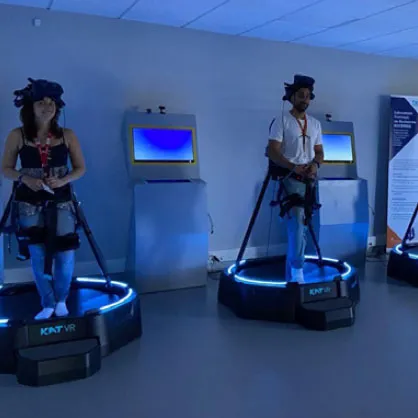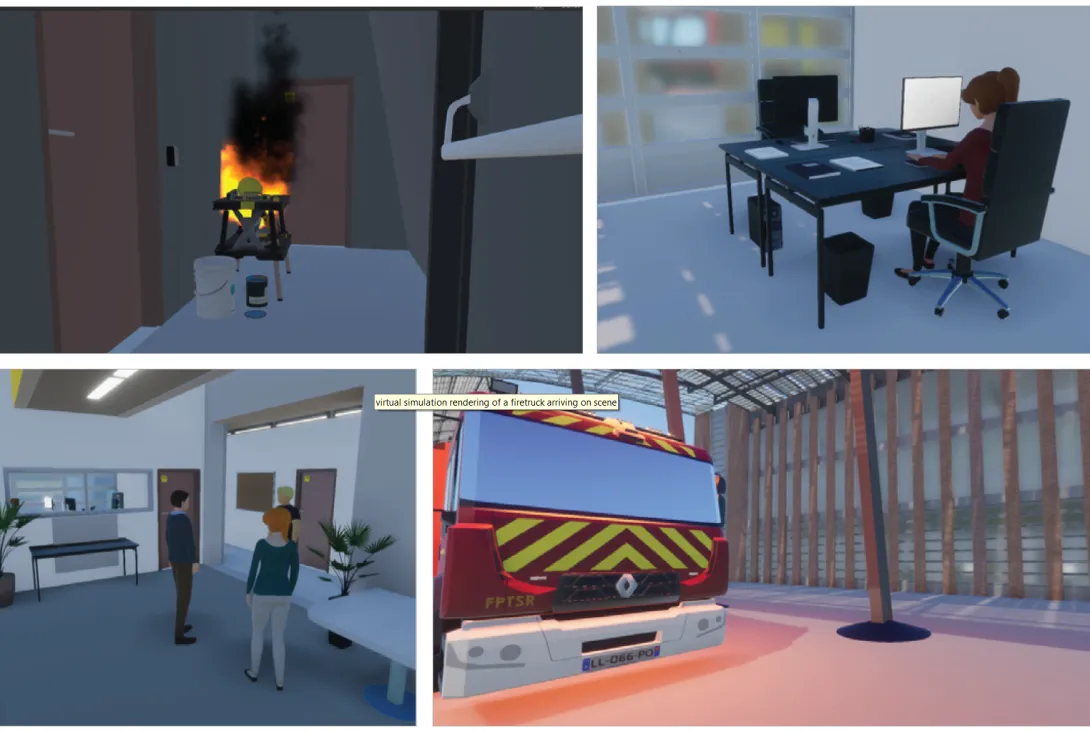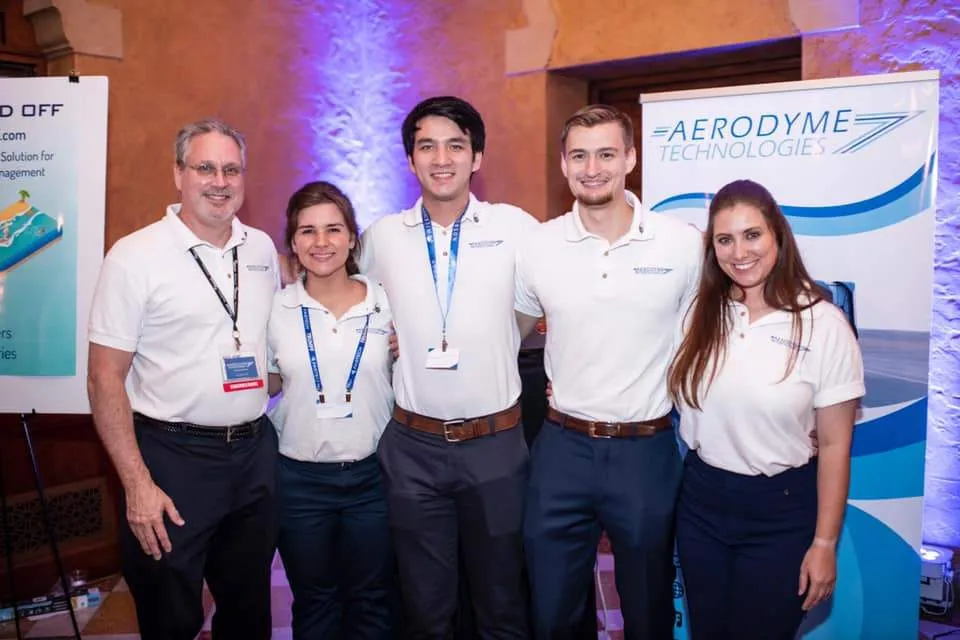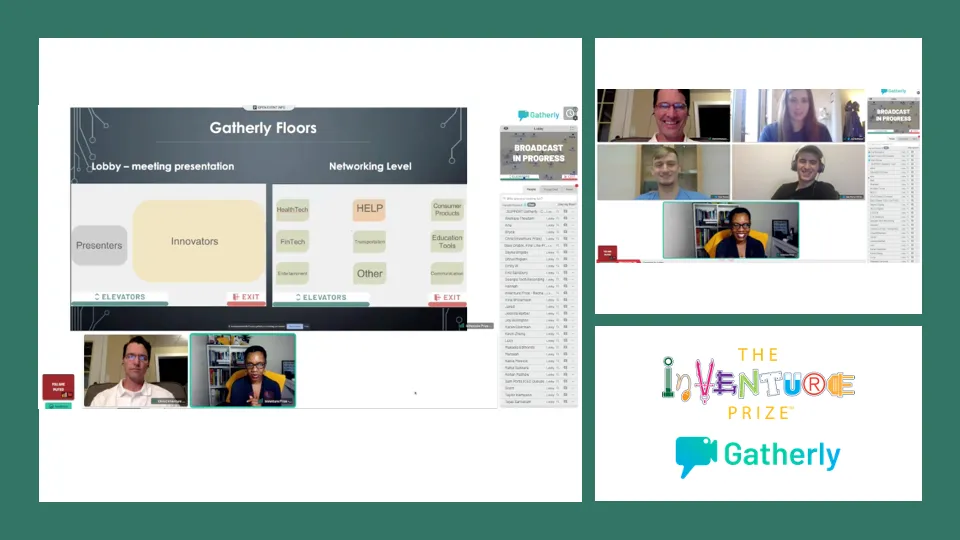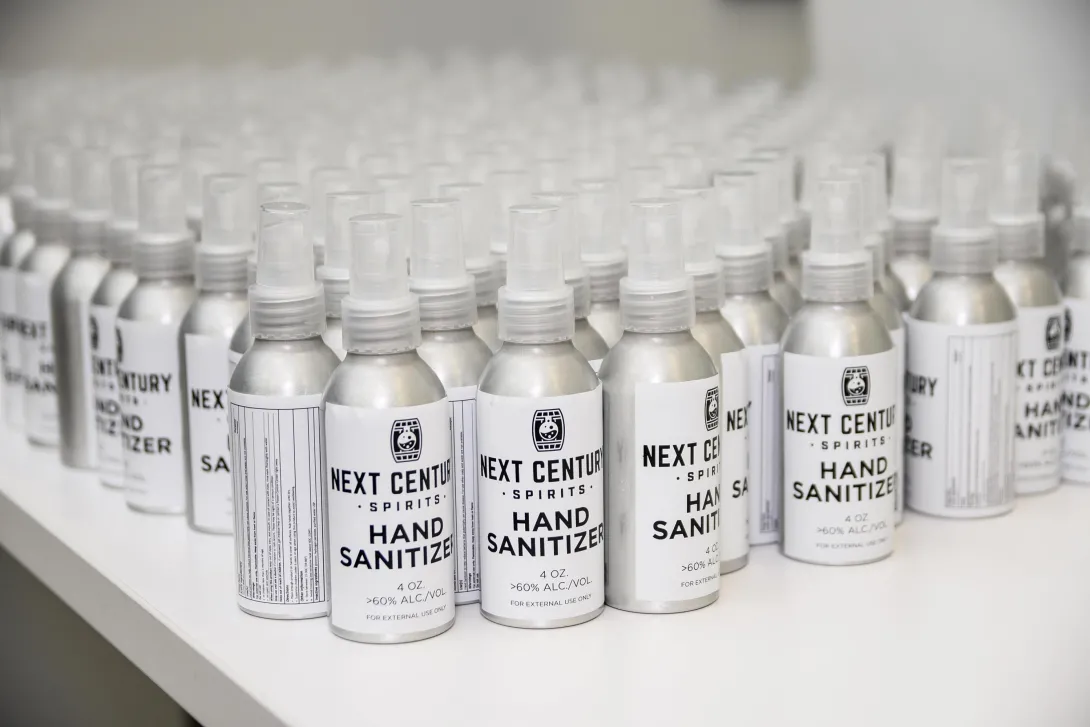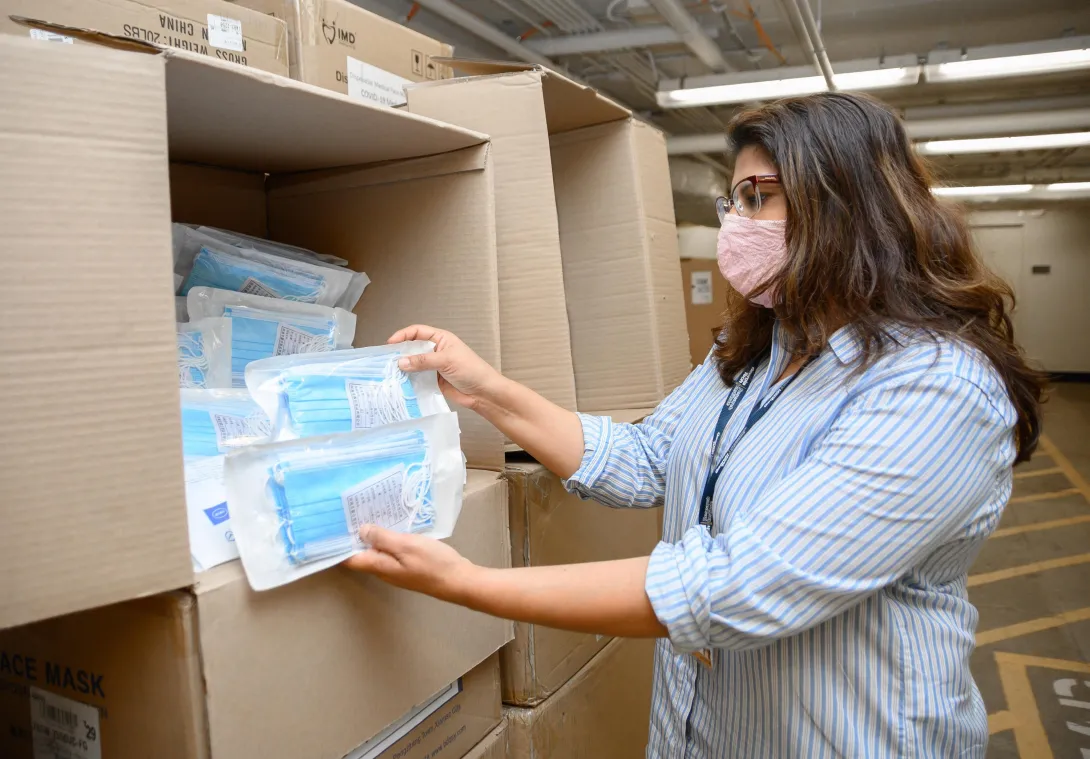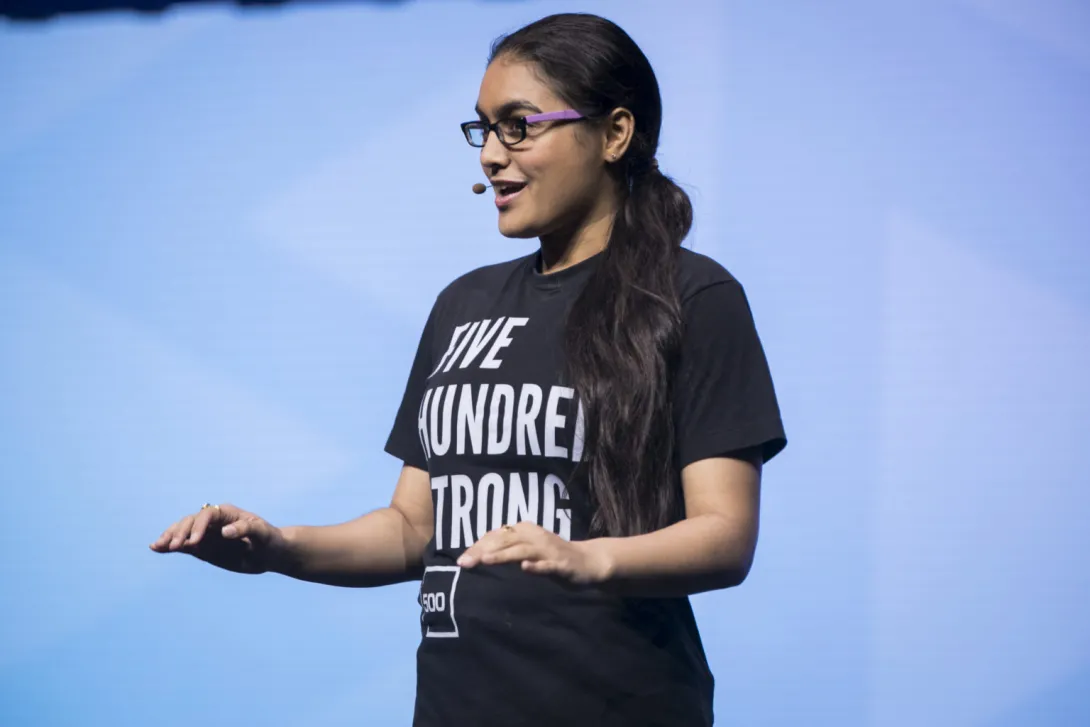Dec. 10, 2020
The Georgia Tech Supply Chain and Logistics Institute (SCL) is the largest such group in the world, and it provides researchers with many opportunities to help solve global supply chain and logistics problems. The latest addition is the SIReN (Sentient Immersive Response Networks) Lab, dedicated to research leveraging immersive technologies to enhance human capabilities for engineering and managing supply chains and logistic systems.
The SIReN Lab is an associate international laboratory, the result of a partnership between SCL’s Physical Internet Center and IMT Mines Albi, part of the Mines-Telecom Institute in France. The two organizations have historically collaborated on research surrounding artificial intelligence and its interface with these immersive technologies. The SIReN Lab is an extension and formalization of that relationship.
The U.S. arm of the lab is housed in the H. Milton Stewart School of Industrial and Systems Engineering (ISyE) and is directed by Benoit Montreuil, Coca-Cola Material Handling & Distribution Chair and professor in ISyE. Montreuil is also co-director
of SCL and director of the Physical Internet Center. The French lab is led by Frederick Benaben, head of the Interoperability of Organizations research team at IMT Mines Albi. Because of the virtual nature of the work, it is possible to have researchers from both labs working on the same experiment, in the same environment, at the same time.
SIReN Lab research is centered around four main types of response networks — demand, health, humanitarian, and crisis — and the human response to them. A demand response network focuses on how the supply network responds to demand and how to prepare for this response, rather than the other way around. The health and humanitarian response networks, which have become increasingly visible due to the Covid-19 pandemic, relate to issues like disaster recovery and various healthcare supply chains.
The French lab has a significant emphasis on crisis response networks, in which a group of people work together to respond to a crisis in a smart, fair, and efficient manner.
“We currently have a crisis management project where 10 people in France and a few in the U.S. are working together at the same time in a digital twin environment,” said Benaben. “For example, we can have everyone in a building where they can fight a fire, but we can also have some of them in a virtual control room exchanging ideas and making decisions. The options are limitless.”
Researchers are using tools such as dashboards, simulations, games, and in some cases virtual or augmented reality to allow participants to see — and in some cases experience — a vivid picture of a situation with other players in the network.
“In augmented reality, we reinforce what participants see with facts, maps, graphs, and other information that enhance what they are experiencing,” explained Montreuil. “In virtual reality, we project the user into a virtual world, which can be a very vivid representa-tion of the current world, or it can be an abstract world. It can be a very powerful tool.”
“When we put someone in an environ-ment where they can touch, learn, train, experiment, and ultimately decide, it changes the way they approach the problem,” added Benaben.
The French lab launched on Nov. 15, 2019. While the spring 2020 launch of the U.S. lab was postponed due to the Covid-19 pandemic, the team already has several projects underway and is fully operational. Eventually, they would like to see additional SIReN labs join the network to further scale the work being conducted.
“We want to become a global leader in making response networks become more sentient and immersive,” said Montreuil. “This is an exciting new approach that we are bringing to ISyE and to the domain.”
News Contact
Laurie Haigh
Communications Manager
Oct. 07, 2020
California, September 14, 2020: TiE Global hosted the 2nd edition of the TiE University Pitch Competition over the weekend. Cash prizes of close to $14,000 and almost $35,000 worth of in-kind prizes were given out to the 13 participants. TiE Atlanta’s Aerodyme Technologies from Georgia Institute of Technology came in first, winning $5000. TiE Silicon Valley’s team Ambii from San Jose State University bagged the second prize, winning $3000; while TiE Toronto’s LSK Technologies, a MedTech startup from the University of Toronto emerged as the third winner, winning $2000.
The winning team, Aerodyme Technologies has created a novel device that saves fuel costs for tractor-trailers by minimizing aerodynamic drag. Ambii, which came in second, provides an in-store music streaming platform for retail outlets, cafes and restaurants without the hassles of licensing. Third prize winner, LSK Technologies, created a diagnostic device for testing infectious diseases such as Covid19 at the point of need.
Congratulating the winning team, Mahavir Pratap Sharma, Chairman of the TiE Global Board of Trustees said, "We are proud of these young talented entrepreneurs. Their growth story from pitches at their local TiE Chapters till the Global Finals has seen a massive expansion and iteration of thought and structure. This is a complete team effort put forward by the program co-chairs and charter member mentors who helped them grow their idea, giving them thorough guidance and mentoring the students over the last few months to compete on a global stage.”
Aerodyme Technologies participated in Georgia Tech’s CREATE-X Startup Launch program during summer 2019. During the startup accelerator program, the Aerodyme team was able to conduct customer discovery and receive mentorship and funding to take their product to market. The team also won 2nd place in the 12th annual InVenture Prize competition in March 2020. As part of the competition, Aerodyme received $10,000 in cash and patent filing assistance funded by the Georgia Tech Research Corporations.
The second edition of the TiE University jointly organized by TiE Atlanta & TiE Hyderabad had 13 teams representing TiE chapters from India, Israel, UAE, Israel, USA, and Canada. These teams were previously the chapter winners and were then mentored to participate in the Global finals. After the Semi-final round on Saturday, seven teams were selected for the finals. Teams had a 10-minute pitch to an eminent Jury panel and a 5-minute live Q&A.
Speaking at the Presentation Ceremony the TiE University program co-chairs Dr. Paul Lopez, SubbaRaju Pericherlaand Viiveck Verma, said they are looking to expand the program participation to 40 chapters and 400+ universities worldwide by 2022.
The worldwide jury panel for the finals, consisting of VCs and investors, included Bodhi Capital’s Dharti Desai, Silicon Valley Bank’s Priya Rajan, Elevate Capital’s Kumar Sripadam, and Inflexor Ventures’ Venkat Vallabhaneni. Semi-finals judges from across the globe included Craig Abbott, Rakesh Bhatia, Radhika Iyengar, Rama Devi Kanneganti, Doc Parghi, and Sonia Weymuller.
Apart from the top three winners, prizes were announced in various other categories. Silicon Valley’s Ambii and New Jersey’s Volant from New Jersey Institute of Technology jointly received a $1,500 Best Elevator Pitch award. Similarly, Teams Clean Electric from IIT/BHU, Varanasi representing TiE Mumbai, and Aruga Technologies from Carnegie Mellon University representing TiE Pittsburgh jointly received $1,500 Best Technology prize. Frinks, from IIT Hyderabad, representing TiE Hyderabad took the $500 People's Choice Award. Apart from this, all participating teams walked away with technology and service prizes worth $2500 per team.
The competition also hosted a keynote address by serial entrepreneur Thejo Kote. Thejo sold his connectivity startup, Automatic for $115 million to SiriusXm. He inspired the university startup teams and online audience alike by saying, “The biggest lesson I’ve learned along the way is to make sure you enjoy the journey (of building a startup) and it’s something that you learn from and grow from. Else it will be a lot more challenging.”
About TiE University:
TiE University program focuses on enhancing the learning objectives of university students globally through the creation and presentation of business pitches for startups and new small business ventures so that they aspire to become entrepreneurs. TiE University is looking to expand its reach to 40 chapters and 400+ universities worldwide. If you’re interested, reach out to the below-mentioned media contact. For more information, visit - https://tie.org/tie-university/
About TiE Global:
TiE Global, is a non-profit organization dedicated to fostering entrepreneurship around the World. TiE strives to inspire entrepreneurs through mentoring, networking, education, incubating and funding programs and activities. With nearly 2000+ events held each year, TiE brings together the entrepreneurial community to learn from local leaders, as well as each other. Few of the annual flagship events conducted by TiE are TYE, TiE Women, TiE University, TiECons and TGS. For more information, please visit our website at https://tie.org/
Media Contact:
Aparna Mishra Aparna@tie.org
Oct. 07, 2020
By Jessica Barber
On Wednesday, September 16, the Office of Undergraduate Education (OUE) hosted the kick-off session for the 13th Annual InVenture Prize. With over $35,000 in prizes, the competition is the holy grail of college entrepreneurship. Although the InVenture Prize officially starts in January 2021, students have already begun their preparations and idea declarations.
Unlike previous years, the kick-off was hosted online through Gatherly, a virtual event platform recently built by none other than Georgia Tech students. Despite this, attendees did not miss a beat. The kick-off marked a return to normalcy for the Georgia Tech innovation community from learning key information about the competition to directly speaking with past winners.
After a welcome from interim Assistant Director of Student Innovation, Recha Reid, students were given an overview of some upcoming InVenture Prize events, including the ongoing Pitch Your Idea and IdeaBuzz sessions. Students were given an overview of OUE’s customer discovery, financial forecasting, marketing, and patent/copyright workshops. From there, the floor was turned over to Dr. Chris Reaves, executive director of the office for Academic Enrichment Programs.
“At its core, the InVenture Prize is an invention startup competition, but we work together — even the teams work with each other — to help one another. We achieve more, grow more, and develop our companies better when we’re helping each other, and that’s a big part of what we’re doing,” Reaves explained.
Later, students were given the opportunity to speak with representatives from Queues and Aerodyme, the respective first- and second-place winners of the 2020 InVenture Prize. Students learned firsthand what it takes to succeed on the InVenture Prize stage; the teams later offered advice on the invention process, their lessons learned, and the visibility benefits of participating in the competition.
“If you’re on the edge right now about doing InVenture Prize, definitely do it. We actually had that same thought before we did it, and we’re just so glad that we did. It’s a lot of work, and you’re going to step outside of your comfort zone, but it’s so worth it”, said Joy Bullington of team Aerodyme Technologies.
Queues team member Sam Porta similarly had some words of encouragement for those looking into the 2021 InVenture Prize.
“The difference between an entrepreneur and someone who’s just engineering something is persistence, and the InVenture Prize is a great opportunity to test this. If you think you’ve come up with something great that has a lot of value, then, by all means, do it,” Porta emphasized.
Towards the end of the session, students were invited to visit virtual “booths” dedicated to areas of health, retail, fintech, transportation, education tools, gaming, and networking.
“InVenture is honestly one of the reasons I chose to come to Tech, and I’m just so excited to come into with something that I’m really confident about,” an attendee said.
“The most interesting thing about tonight was hearing from the past winners and having them talk about their experiences. Definitely super excited to apply, and hopefully we do really well,” another stated.
Registration for the 2021 InVenture Prize will remain open until January. Student innovators are invited to check out OUE’s information and development sessions to be held throughout the Fall semester. All dates and related topics can be found at innovation.gatech.edu and inventureprize.gatech.edu.
FIND OUT MORE ABOUT THE 2021 INVENTURE PRIZE BY CLICKING HERE
Visit us on
Instagram @gtinventure
Twitter @InVenturePrize
Jul. 01, 2020
Jun. 30, 2020
As America’s leading research universities ramp up laboratory operations that were shut down by Covid-19 in March, they’re encountering a perfect storm of challenges in providing personal protective equipment (PPE) – surgical masks, cloth face coverings, gloves, hand sanitizer, and disinfectant materials.
Global PPE supply chains have been severely disrupted by the coronavirus pandemic, producing long lead times and unreliable deliveries. At the same time, Covid-19 precautions are mandating the use of PPE in laboratories where it wasn’t required before, such as computer and electronics labs. And as researchers, staff, and graduate students slowly come back to the lab, predicting how many people will be at work on any given day creates yet another unknown.
At the Georgia Institute of Technology, supply chain and logistics experts have put their knowledge to work on the problem, using the kind of modeling and machine learning technologies that major retailers rely on to keep products on store shelves. In just one month, the research team has built an automated centralized system to replace traditional purchasing systems in which individual labs had to hunt for their own supplies.
By asking researchers to report details of the PPE they use each day, the labs will provide data the system needs to predict demand, allowing Georgia Tech to place large orders and stock a centralized warehouse that will help bridge the gap between supply chain hiccups. Based on usage data, the system will know when each lab’s stock of PPE needs to be resupplied from distribution centers located in 22 major laboratory buildings. The goal will be for each lab to have a robust three-day supply of PPE at all times.
“We need to make sure that every researcher, staff member, and graduate student is going to be protected properly,” said Benoit Montreuil, a professor in Georgia Tech’s School of Industrial and Systems Engineering (ISYE) and director of the Georgia Tech Supply Chain and Logistics Institute. “We are dealing with a very volatile situation for supply capacity, lead times, alternate sources, and reliability. With this system, we can ensure that the distribution of PPE throughout campus will be done in an efficient, seamless, responsive, and fair way.”
With $1 billion in sponsored activity during 2019, Georgia Tech has hundreds of research laboratories studying everything from viral antibodies and stem cells to robotics and electronic defense. In peak times, those researchers are expected to use 400,000 gloves a month and 20,000 surgical masks. With new sanitizing guidelines, they’re expected to use more than 4,000 gallons of hand sanitizer a month – but nobody really knows for sure, because this wasn’t widely required before.
Prior to the Covid-19 pandemic, most labs were responsible for purchasing their own PPE. But with so many labs worldwide now hunting for materials in the same disrupted supply chains, that’s no longer possible.
“Georgia Tech can ensure better success in obtaining PPE by buying in very large quantities instead of asking individual lab managers to try to find stock on their own,” said Robert Butera, Georgia Tech’s Vice President for Research Development and Operations. “We can track down the best suppliers and create a buffer in the system. We’ll also be able to identify who are the most reliable suppliers.”
From individual laboratories, the system needs daily reports of how many gloves, masks, and other PPE are used. The system aggregates the numbers and uses that information to predict future usage, allowing Montreuil and his team to provide information to Georgia Tech’s Environmental Health and Safety (EHS). Baseline information obtained during Phase 1 of the research ramp-up will help plan for PPE needs as the number of researchers increases during Phase 2.
Individual labs won’t need to place orders unless than they encounter an unexpected change in demand.
“Rather than principal investigators requesting PPE for their labs and having to anticipate demand, they will log usage and the platform will do all the back-end work to make sure there’s a three-day supply in each lab and a two-week supply in the buildings,” Butera explained. “We are switching from making requests to logging usage in real time. People have to log their use of PPE on daily basis to make sure they are supplied.”
The new system will supply an estimated 95% of PPE needed on campus. Other items that are purchased less frequently, such as lab coats and shoe coverings, will continue to be ordered through traditional means. Those other supplies may be added to the system later.
“The idea is to focus right now on the key PPEs that are most critical from a supply perspective,” said Montreuil. “We will be revising consumption predictions on a daily basis and transferring this information into an overall demand forecast for PPEs.”
Georgia Tech’s research enterprise is ramping up in two phases over the summer. The first phase began June 18, and the second will start July 13. The new PPE supply system launches July 1.
To initiate the system, EHS has provided a stock of supplies to each lab, and that initial stock will be replenished based on the new system. In Phase 2 of the research ramp-up, the system will grow to include distribution centers in more than 50 campus buildings. At this point, Georgia Tech Research Institute (GTRI) labs will receive their PPE through a separate supply system.
PPE distribution will begin at a campus warehouse managed by EHS. To meet the predicted demand, the warehouse will regularly distribute supplies to buildings, where managers will in turn supply individual labs. How labs receive their supplies will depend on building-level plans developed by managers, Butera said.
The centralized and automated system will for the first time allow administrators to know how much stock of each PPE item is available on campus. Ensuring adequate stock has become increasingly important with the protection needs of the Covid-19 environment.
While researchers who work with biological and chemical materials are accustomed to using and maintaining PPE stocks, keeping up with face masks and disinfectant stocks will be a new practice for others.
“In my lab in ISYE, nobody was using PPE before Covid-19 because we are only around workstations and computer displays,” said Montreuil. “Now, ISYE researchers won’t be able to get into the lab unless they have masks and we will provide hand sanitizer. We will have to get used to this change.”
Georgia Tech has one of the world’s best industrial engineering schools, and supply chain and logistics research is a key part of that. But even that expertise is challenged by the global logistics issues created by the pandemic, he added.
“The basics of inventory replenishment systems are well known,” Montreuil said. “But most of the time, the assumptions made in the models are very different from the environment we have now. With highly disrupted settings around the world, we find ourselves on a new frontier. It’s not a lab problem, a building problem, or a Georgia Tech problem. It’s a global challenge, and it affects everybody.”
Below are some frequently-asked questions about PPE supplies.
Where is the form to log use of PPE?
The form is available at this link.
Which PPE items are covered by the system?
Consumption of the following items should be reported: Pairs of nitrile gloves by size (S/M/L/XL), pairs of latex gloves by size (M/L), pairs of vinyl gloves, individual surgical masks, individual cloth masks, hand sanitizer by bottle, disinfecting spray by bottle, and disinfecting wipes by package.
How should consumption be reported?
Reporting usage by individual lab occupant would be most useful to the system because it will provide the most detailed data for predicting future use. But if labs cannot report usage by individuals working in the lab, they should provide daily data on the entire lab.
When are labs expected to begin reporting their daily consumption of PPE?
The system is operational now, and labs will be expected to start using it July 1.
Will GTRI labs obtain their PPE through this system?
No, GTRI has a separate system for providing PPE.
How will PPE supplies be restocked from buildings to individual laboratories?
Building managers will receive supplies from EHS and will be responsible for determining how labs will receive replenishment.
What should labs do with empty hand sanitizer and disinfectant spray bottles?
Empty hand sanitizer and disinfectant spray bottles should be returned to building managers for refill from bulk supplies. There is a shortage of bottles and reuse will help prevent shortages.
What is the lead time for PPE materials ordered from suppliers?
That varies according to the item. The median lead time for nitrile gloves has ranged from 11 to 53 days depending on glove size, with shortest for various sizes ranging between 7 and 11 days while the longest ranged between 11 and 130 days, depicting a high volatility. Supply chain challenges for hand sanitizer led Georgia Tech to work with non-traditional suppliers to create an alternative supply chain based on ethanol rather than isopropyl alcohol.
If labs will be provided with a robust three-day stock, how much will be at building depots?
Buildings should have a robust two-week supply of critical PPE items. The adjective robust is important as the aim is not to keep a stock covering an average three-day demand in labs, and an average two-week demand in buildings, but rather enough to cover demand considering consumption and supply stochasticity with degree of confidence. The three-day and two-weeks targets will be dynamically adjusted according to learning of the overall demand and supply chain dynamics.
Where can I get more information about accessing the consumption reporting system?
Please visit https://ehs.gatech.edu/covid-19/isye.
What if labs need certain supplies immediately?
An urgent request can be made using the urgent request form. At this point, ISYE is monitoring the requests and will notify the building manager. In the near future, requests will go directly to the building manager (or other point of contact).
Research News
Georgia Institute of Technology
177 North Avenue
Atlanta, Georgia 30332-0181 USA
Media Relations Contact: John Toon (404-894-6986) (jtoon@gatech.edu)
Writer: John Toon
News Contact
John Toon
Research News
(404) 894-6986
Jun. 15, 2020
Dipayan Banerjee, a rising second-year Ph.D. student studying operations research in the H. Milton Stewart School of Industrial and Systems Engineering, has been awarded a Graduate Research Fellowship (GRF) by the National Science Foundation (NSF). Banerjee, who has a bachelor’s degree in industrial engineering and management sciences from Northwestern University, is co-advised by UPS Professor of Logistics Alan Erera and Leo and Louise Benatar Early Career Professor and Associate Professor Alejandro Toriello.
“Dipayan is a rising researcher in logistics, and the NSF fellowship is yet another accolade testifying to his promising young career,” said Toriello. “I look forward to working with him in the coming years in last-mile logistics and e-commerce, an exciting area where Dipayan has the potential to make a significant contribution.”
Banerjee is studying the tactical design of last-mile delivery systems, which are a challenging supply chain problem. The last mile in a supply chain represents the transport of goods being delivered, for example, from a local warehouse to a home or business. Specifically, Banerjee is looking at issues related to designing delivery fleets and vehicle dispatch policies for cost-effective last-mile delivery within a particular region.
“You can pack a big truck full of bulk quantities of goods and efficiently transport them across the U.S.,” Banerjee explained. “But getting the goods to a consumer’s home is less efficient, since individual items are being delivered. You could also see the importance of last-mile logistics during the Covid-19 lockdowns, when so many people were ordering and receiving their groceries at home.”
Beyond the demand dictated by the pandemic, Banerjee noted that e-commerce supply chains have become fundamental to the average person’s life, and hundreds of companies ranging from bakeries to florists are responding accordingly.
“It’s a really exciting time to be studying transportation and logistics systems,” he says. “There are many fascinating new challenges being faced in the last mile as companies seek to deliver more and more goods on increasingly tighter deadlines. These include issue of accessibility and environmental sustainability. We also have so much data and advanced computing power at our disposal that wasn’t available five or 10 years ago. I’m excited about the opportunity to develop new operations research approaches to solving these problems.”
Established in 1951, the NSF Graduate Research Fellowship is the oldest fellowship of its kind. The fellowship recognizes and supports outstanding graduate students in STEM disciplines who are pursuing research-based graduate degrees at accredited U.S. institutions. Fellows receive a three-year annual stipend of $34,000, along with a $12,000 cost of education allowance for tuition and fees (paid to the institution), opportunities for international research and professional development, and the freedom to conduct their own research at any accredited U.S. institution of graduate education they choose.
May. 28, 2020
IDEaS recently awarded a series of grants to stimulate the research efforts of Georgia Tech’s brightest minds in data science and related disciplines. Faculty and student research programs targeted for IDEaS awards must demonstrate research goals that will be highly cross-disciplinary and emphasize how data science can assist in related research areas.
The Data Science Research Scholarships program will support scholarships for the Spring 2020 semester and focus on Ph.D. student research that enables new collaborative research or adds a data science dimension to established research projects. Each scholarship will fund 50% of the cost of a GRA appointment, with the project PI funding the remaining 50%.
Data Science Research Scholarships 2020 Awards
- JC Gumbart (Physics) & David Sherrill (Chemistry): Force-field Development to Enable Simulations of Xeno-nucleic Acids
- Xiuwei Zhang (CSE) & Haesun Park (CSE): Development of an Integrative Clustering Method for Single Cells
- Vince Calhoun (ECE) & Audrey Duarte (Psych): The Chronnectomics of Memory
- Annalisa Bracco (EAS), Jie He (EAS) & Matt J. Kusner (University College London): Machine-learning Techniques for Cloud Modeling
- Toyya Pujol-Mitchell (ISYE), Nicoleta Serban (ISyE) & Constantine Dovrolis (CS): Network Weight Prediction Using Node Attributes
- Xiaofan Liang (City & Reg Planning), Clio Andris (City & Reg Planning) & Diyi Yang (IC): Advancing Metrics for Spatial Social Networks in the Era of Big Data
- Omar Asensio (Public Policy): Do Micromobility Options Reduce Traffic Congestion? Quasi-experimental Evidence from Uber Movement Data
- Constantine Dovrolis (CS) & Kelly F. Ethun (Emory/Yerkes): Connections Between Social Behavior and Food Intake in Rhesus Macaques
- Diyi Yang (IC) & Mai ElSherief (IC): Defining, Characterizing, and Detecting Implicit Discriminatory Speech Online
- Umakishore Ramachandran (CS) & Zhuangdi Xu (CS): Generating Labeled Vehicle Tracking Dataset for Large-scale Geo-Distributed Camera Networks
- Surya R. Kalidindi (ME/CSE/MSE) & Christopher Saldana (ME): Advanced Materials-Manufacturing Data Curation
- Agata Rozga (IC), Thomas Ploetz (IC) & external: Annotation of Datasets from Severe Behavior Treatment Program at the Marcus Autism Center
Data Science Partnership 2020 Awards
- Diyi Yang (IC): Allen Institute for AI and University of Washington
- Josh Kacher (MSE): Lawrence Livermore National Laboratory
- Rachel Cummings (ISyE): Georgetown University and U.S. Census Bureau
Data Science Speaker Travel Awards supports visits to the Georgia Tech campus by external experts in the areas of data science foundations or data-driven discovery in any discipline. Funds may be used to host a guest speaker for the IDEaS seminar series, or to participate in another on-campus event, conference, or seminar series. Awardees’ invited guests are experts in either mathematical data science or data science engineering.
Data Science Speaker Travel 2020 Awards
- Betsy DiSalvo (IC): Data Work Civic Engagement Panel
- Diyi Yang (IC): Natural Language Processing/Computational Social Science Seminar
Pagination
- Previous page
- 4 Page 4
- Next page
